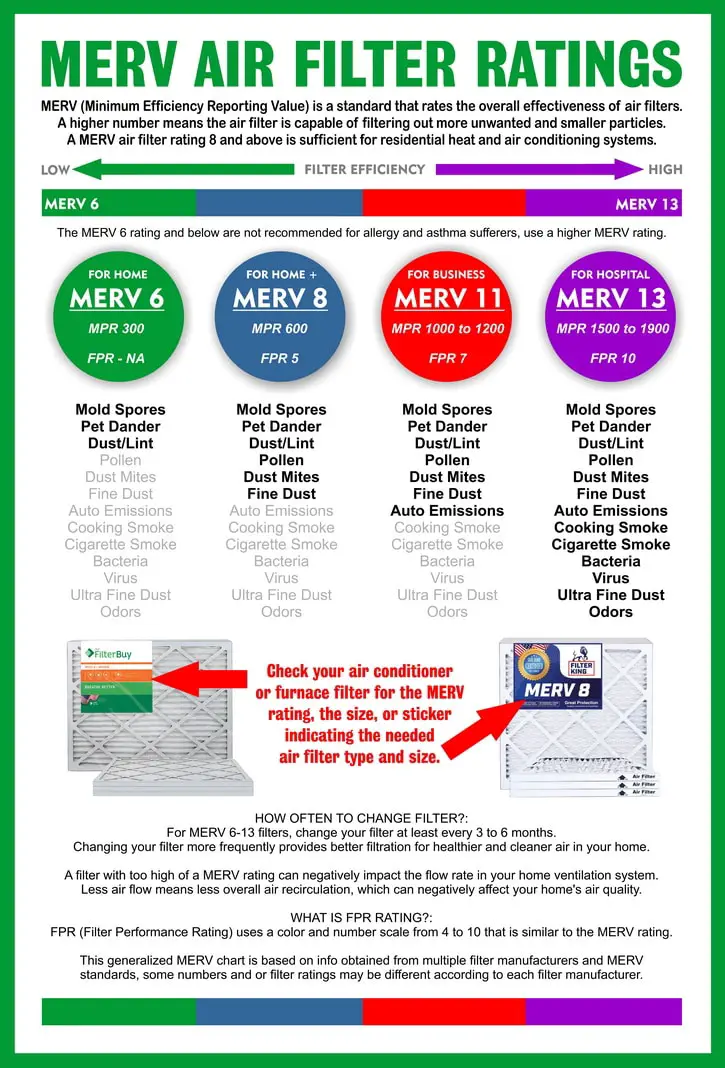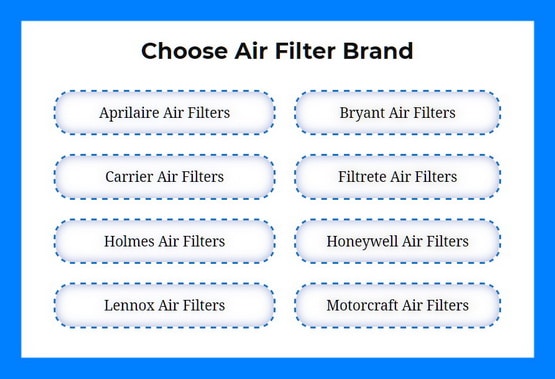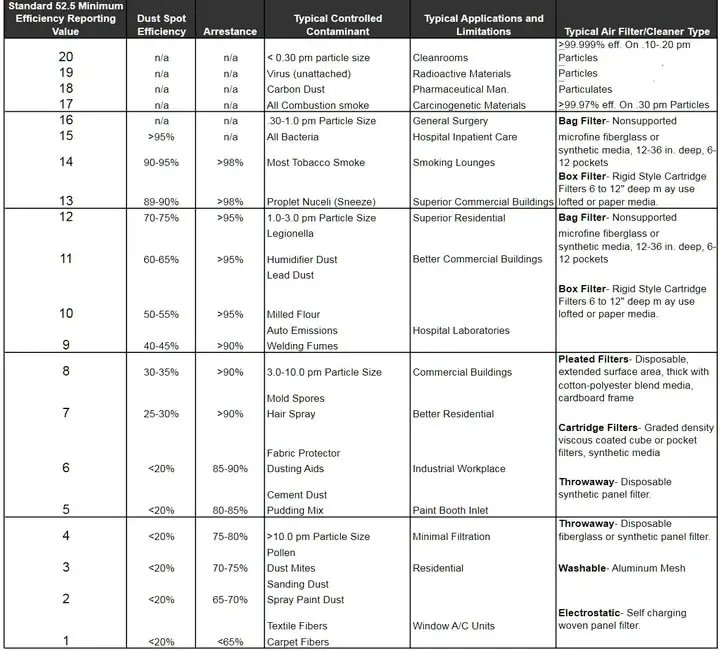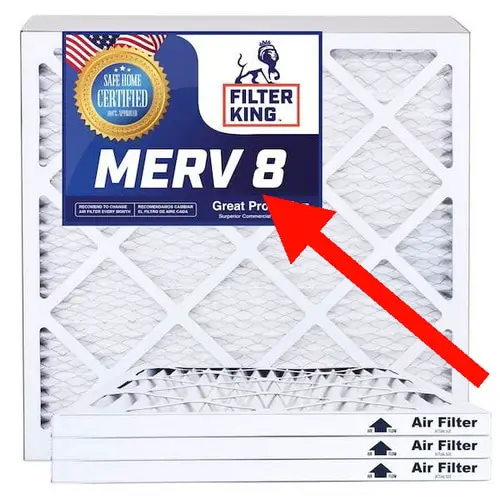MERV or (Minimum Efficiency Reporting Value) is a common standard that rates how effective an air filter is. The larger number MERV rating means better air filtration. EX: A MERV 13 rating will catch more particles than a MERV 8 rating. The higher the MERV rating, the better the filter works to catch most dust particles and other airborne contaminants.
 MERV or (Minimum Efficiency Reporting Value Chart)
MERV or (Minimum Efficiency Reporting Value Chart)
See the MERV rating chart on this page to see which MERV rating number is best for you. We recommend using a MERV rating 11 or higher if you have pets in your home. Without pets, you can use a MERV 8 rated air filter as this filters out most harmful particles.
MERV or Minimum Efficiency Reporting Value was created by the ASHRAE or the American Society of Heating, Refrigeration and Air Conditioner Engineers.
The US Department of Energy recommends MERV 13 for the highest filtering and ASHRAE recommends MERV rating 6 or higher.
The MERV values go from 1 up to 16. The higher MERV value means more efficient filters.
Full MERV Value Chart in text format:
MERV VALUE:
MERV 1
MERV 2
MERV 3
MERV 4
These MERV filters trap the average particle size (3.0 – 10.0 micron) less than 20%.
The filters will trap: Normal household dust, spray paint overspray dust, pollen, dust mites, carpet fibers.
MERV VALUE:
MERV 5
MERV 6
MERV 7
MERV 8
These MERV filters trap the average particle size (3.0 – 10.0 micron) from 20% to 85%.
The filters will trap: Cement dust, mold spores, hair sprays, and fabric protector particles.
MERV VALUE:
MERV 9
MERV 10
MERV 11
MERV 12
These MERV filters trap the average particle size (3.0 – 10.0 micron) 85% or better.
The filters will trap: Automotive emissions, cooking smoke, humidifier dust, lead dust, and milled flour.
MERV VALUE:
MERV 13
MERV 14
MERV 15
MERV 16
These MERV filters trap the average particle size (3.0 – 10.0 micron) 90% or better.
The filters will trap: Viruses, bacteria, smoke, airborne germs, hospital atmosphere.
Most residential homes use a MERV 6 air filter or above to filter out contaminants such as dust and pollen. Many asthma and allergy sufferers choose to use a higher MERV rating such as MERV 11 or MERV 13 to filter out more of the pet dander and other harmful contaminants in the air.
If you are trying to choose the best MERV rating for your home or apartment, you will have to consider if you suffer from allergies or have asthma. A MERV rating of 8 will be sufficient for most households without pets. However if you find yourself sneezing or having allergy issues, the best filter is a MERV rating of 11 or higher.
 Air filters at appliancefilter.com
Air filters at appliancefilter.com
Usually a higher MERV rating air filter will cost more money as these are commonly hospital grade air filters. If you are looking to use the least expensive air filter, you can use a MERV 6 or MERV 8 in a normal household without pets. These lower MERV rated filters will cost less than a MERV 11 or MERV 13 air filter on the market today.
If you are an allergy sufferer and want to use the highest MERV rating such as 13 or above, remember that even though this will filter out more particles and help you to breathe better, your air conditioner or furnace will have a difficult time with the more efficient filter installed as it will have more resistance because it is more dense.
A high number MERV rated air filter in your home will create more resistance in airflow in your HVAC system. This reduces the air flow in your AC system and may actually worsen the quality of the air in your home. A higher MERV rated air filter can put a large amount of pressure on the fan of AC system. So try to choose a filter and MERV rating that is best for your current HVAC system.
Air filters with a higher MERV rating need to be changed more often. These are usually changed every 3 months because of the setting they are used in. Changing the air filter often is to avoid restricted airflow and improve efficiency of the HVAC system.
An average air filter MERV rating 6 or 8 can be changed every 6 months depending on the conditions. Most MERV 6 or MERV 8 air filters are rated for 6 months of use in a normal setting.
Other facts about MERV rated air filters:
– On average, most residential home air systems can adequately remove airborne contaminants with a filter rated between MERV 6-11.
– Common particles that these MERV rated air filters are tested for include mold spores, dust, pet dander, bacteria, pollen, dust mites, cooking smoke, textile and carpet fibers, and tobacco smoke.
– MERV 14-20 air filters are ultra high grade and found in hospital and or medical settings.
What is FPR rating with air filters?:
FPR (Filter Performance Rating) uses a color and number scale from 4 to 10 that is similar to the MERV rating.
ASHRAE = American Society of Heating, Refrigeration and Air Conditioner Engineers.
Have questions about the MERV rating, MERV chart, or FPR rating on air filters? Please leave a comment below and we will assist you.





Leave a Reply